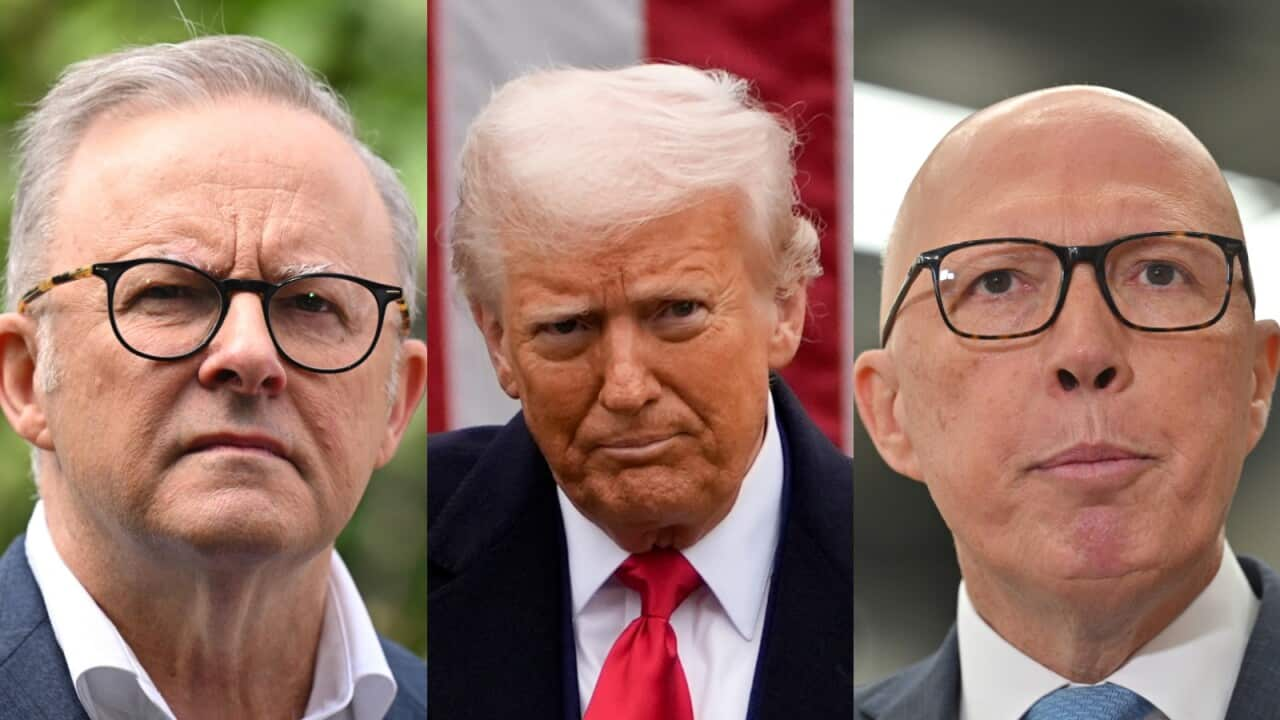Australian farmers are urging calm in the face of fresh tariffs imposed on Australian exports by the United States — unless you're a burger consumer in America.
On Thursday, US President Donald Trump laid out his Liberation Day plans, announcing reciprocal tariffs that trade partners would face from 5 April.
Trump singled out Australia's beef industry in his speech, alluding to a potential ban on beef imports as he delivered a widespread 10 per cent tariff. However, SBS understands there will be no explicit ban on beef.
"We imported $3 billion of Australian beef from them just last year alone. They won't take any of our beef. They don't want it because they don't want it to affect their farmers," Trump said.
Australia has controls on the importation of fresh US beef and beef products due to concerns about bovine spongiform encephalopathy, also known as mad cow disease.
Australian consumers unlikely to be impacted by tariffs
Western Australia beef farmer Mark Thomas was relieved to see Australia was on an "even playing field with the rest of the world".
"It looks like 10 per cent is the lowest that has been put on countries. So I'd say, considering that's all we've received, it's a good result," he told SBS News.

Mark Thomas is a livestock farmer from Western Australia. Source: SBS News / Christopher Tan
"Currently, beef export prices are historically high, largely due to the fact that America has got very low herd numbers," Thomas said.
In 2024, Australia exported 394,716 tonnes of beef to over 100 markets, worth $4.16 billion, according to the Red Meat Advisory Council (RMAC).

Australia exported more than 394,000 tonnes of beef to over 100 different markets in 2024. Source: SBS News / Christopher Tan
"While they still have a margin, they will be looking to buy cattle."
Thomas said Australians should remain largely unaffected at the checkout, as prime steaks aren't exported to the US.
"A lot of it's lean trim, which is used for hamburgers. So unless you're having hamburgers every night, you're probably not going to be too affected," he said.

Tony Hegarty is a beef and sheep producer in the Hunter Valley, NSW. Source: Supplied
As the chair of the NSW Farmers Association cattle committee and with over 40 years' experience as a farmer, Hegarty said Australia's market had diversified in the face of similar pressures.
"We've dealt with it before, with China recently, but even back as far as the mid 70s, when UK left us and went into the EU [European Union], we had to diversify into markets, and that's what our industry has done over a long period of time," Hegarty told SBS News.
He said that while there may be short-term impacts, the market will adjust and ship its produce elsewhere. It will largely be US customers who face increased costs due to the measures.
How US tariffs will drive up Big Mac prices in America
However, the announcement is bad news for Big Mac lovers in America, including Trump.
Americans consume roughly six billion hamburgers containing Australian beef each year, according to RMAC estimates.
Tariffs, which are taxes imposed on goods imported into a country, could push up burger prices in the US as suppliers try to cover the extra fee.

Tariffs could push up burger prices in the US. Credit: Official White House photograph by Joyce N. Boghosian
"Without Australian lean beef blended with local fatty trim, the US would need to use higher value cuts in their burgers and miss out on valuable export opportunities," he said in a statement.
While expressing disappointment, Australian Meat Industry Council CEO Tim Ryan maintains the US remains an important market for Australian meat.

Source: SBS News
"We play an important role in the US meat market, and currently they're experiencing a shortage, so Australian product will continue to have a role in supplementing US domestic production."
They clarified that Australia does not have a ban on US beef exports, but has requested that beef made in the US from cattle born and raised in Mexico or Canada undergo biosecurity and food safety assessments.
Industry welcomes government response
Standing up shortly after Trump, Prime Minister Anthony Albanese labelled the 10 per cent tariffs as "not the act of a friend" and encouraged Australians to buy local.
"We will promote buying Australian is one way that we can respond. We can be proud of our products," he told reporters in Melbourne.
"We can't control what the US administration determines, but we can engage with them. This is a decision that they have made. It's one which we think, importantly, is not in the interests of the United States."
Albanese announced $50 million in government funding for affected industries seeking new export markets.
David Jochinke, president of the National Farmers' Federation, welcomed the funding amid ongoing work with the government to support Australian agriculture and farmers.
"This is the time to stand up for Australian farmers and get behind us to continue our workers producing high-quality food for not only the nation but the world," he said.
Opposition leader Peter Dutton criticised the government for not securing an exemption for Australia.
"If the prime minister had leveraged (critical minerals and defence) within the relationship before now, I think we would find ourselves in a different position today," he told reporters in Perth.
"We would have had greater connection and greater communication with the White House, and we demonstrated that only a few years ago."
No countries have secured tariff exemptions. Mexico and Canada were not included in this round of tariffs as they already have 25 per cent tariffs on them. Russia, Cuba, Belarus and North Korea were also absent from the list, but they already face "extremely high tariffs", according to the White House.



